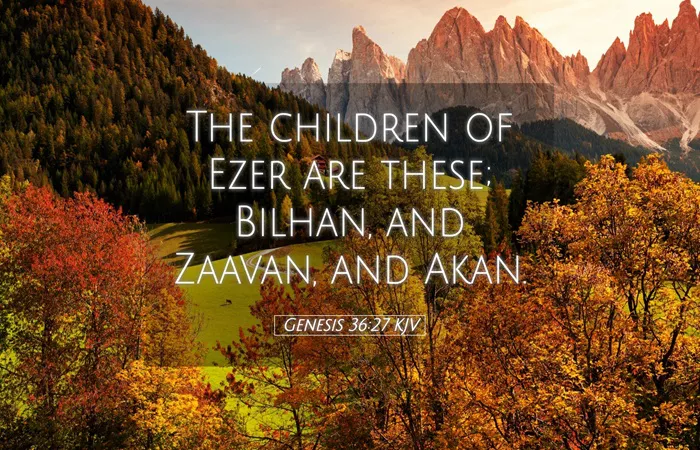Read the Daily Bible Verse – Genesis 36:27 To Strengthen Your Spiritual Journey.
Genesis 36:27 is a relatively brief yet significant verse within the broader context of the genealogies found in the book of Genesis. This article aims to unpack the meaning of this verse, its context, applications for modern life, and its relevance in comparison to other biblical texts.
The Context of Genesis 36:27 (KJV)
Historical Background
Genesis, the first book of the Bible, provides foundational narratives for the Judeo-Christian tradition. The genealogies, particularly in chapters 36, highlight the descendants of Esau, Jacob’s brother. These sections serve not only as historical records but also as theological frameworks that reflect God’s covenant promises and His sovereignty over nations.
The Narrative of Esau
To appreciate the meaning of Genesis 36:27, one must understand the broader narrative of Esau. Esau, often seen as a foil to Jacob, represents the lineage that diverged from Israel’s chosen path. While Jacob’s descendants become the Israelites, Esau’s lineage evolves into the Edomites, a significant group that appears throughout biblical history.
Overview of Genesis 36
Genesis 36 details the genealogy of Esau, listing his sons and their clans, emphasizing the multitude of nations descended from him. This chapter is crucial in setting the stage for the later conflicts and relationships between Israel and Edom. The listing of names and places indicates the historical and geographical expansion of Esau’s descendants.
The Meaning of Genesis 36:27
Text of Genesis 36:27 (KJV)
The King James Version (KJV) of Genesis 36:27 reads: “And the children of Ezer were these; Bilhan, and Zaavan, and Akan.”
Breakdown of the Verse
The Children of Ezer: Ezer is one of the chiefs of the Edomites. His mention signals the structure of Edomite society, where leaders or chiefs play essential roles.
Names of the Sons: The names—Bilhan, Zaavan, and Akan—carry significant meaning, often tied to the character and identity of their families. Each name might reflect cultural or historical traits significant to the Edomites.
Implications of Lineage: The verse highlights the importance of lineage in biblical culture. Genealogies served not just to preserve family histories but to assert identity and claim rights to land and blessings.
Genesis 36:27 Application in Life
Understanding Identity
Genesis 36:27 invites reflection on our own identities. Just as the Edomites derived significance from their lineage, modern readers can find value in understanding their own backgrounds, recognizing how family histories shape personal and communal identities.
Embracing Diversity
The mention of various clans and leaders illustrates the diversity within God’s creation. It prompts us to appreciate the different backgrounds and experiences that contribute to our communities. Embracing diversity can lead to richer, more fulfilling relationships and collaborations.
Leadership Lessons
The identification of Ezer as a chief can serve as a reminder of the qualities that define effective leadership. Biblical leaders are often marked by their responsibilities toward their people, serving as models for contemporary leaders in various spheres of life.
Comparison with Other Biblical Texts
Genesis 25:23-26
In Genesis 25, the birth of Jacob and Esau sets the stage for their contrasting destinies. God’s prophecy about the older serving the younger emphasizes divine choice, which reappears in genealogical lists throughout the Bible, including Genesis 36.
Numbers 20:14-21
In this passage, the Israelites encounter the Edomites, descendants of Esau. This relationship is strained, reflecting ongoing tensions rooted in their shared history. Such biblical narratives deepen our understanding of intergroup relations and conflict management.
Romans 9:10-13
The Apostle Paul reflects on the theme of divine election, citing the stories of Jacob and Esau to illustrate God’s sovereign choice. This New Testament perspective on Old Testament narratives highlights the continuity of God’s redemptive plan throughout Scripture.
Modern-Day Relevance
Genealogy and Heritage
In an age where individual identity is often fragmented, the focus on genealogy in Genesis 36:27 can inspire contemporary readers to explore their own heritage. Understanding one’s background can provide context and meaning in an increasingly globalized world.
Leadership and Community
The lessons in leadership derived from Ezer’s role resonate today. Effective leadership today requires understanding, empathy, and the ability to unify diverse groups. Leaders can look to biblical examples for guidance on fostering community and promoting harmony.
Conflict Resolution
The historical tensions between the Edomites and Israelites serve as a case study for modern conflicts. The Bible offers a framework for understanding the roots of discord and the potential for reconciliation through dialogue and understanding.
Conclusion
Genesis 36:27, while a small piece of a larger narrative, offers rich insights into identity, leadership, and the importance of lineage. The exploration of this verse reveals its profound implications for both individual lives and broader societal structures.
By examining the context, meaning, and applications of Genesis 36:27, we can appreciate the complexities of biblical narratives and their relevance today. As we navigate our own lives, may we draw lessons from these ancient texts to foster a deeper understanding of ourselves and our communities.
Genesis 36:27 Commentary
In commenting on Genesis 36:27, it is essential to recognize its place within the overarching themes of identity and divine sovereignty. The genealogies in Genesis serve not only as historical records but as theological affirmations of God’s ongoing relationship with humanity.
The mention of Ezer and his sons emphasizes the notion of leadership and responsibility, highlighting how families and communities are shaped over generations. In reflecting on this verse, one can appreciate the intricate tapestry of relationships that define both ancient and modern communities.
Through Genesis 36:27, readers are invited to consider their own legacies and the impact of their heritage on future generations. As we look back, we are reminded that our stories are part of a larger narrative that connects us to one another and to God’s unfolding purpose in the world.
Related topics:


